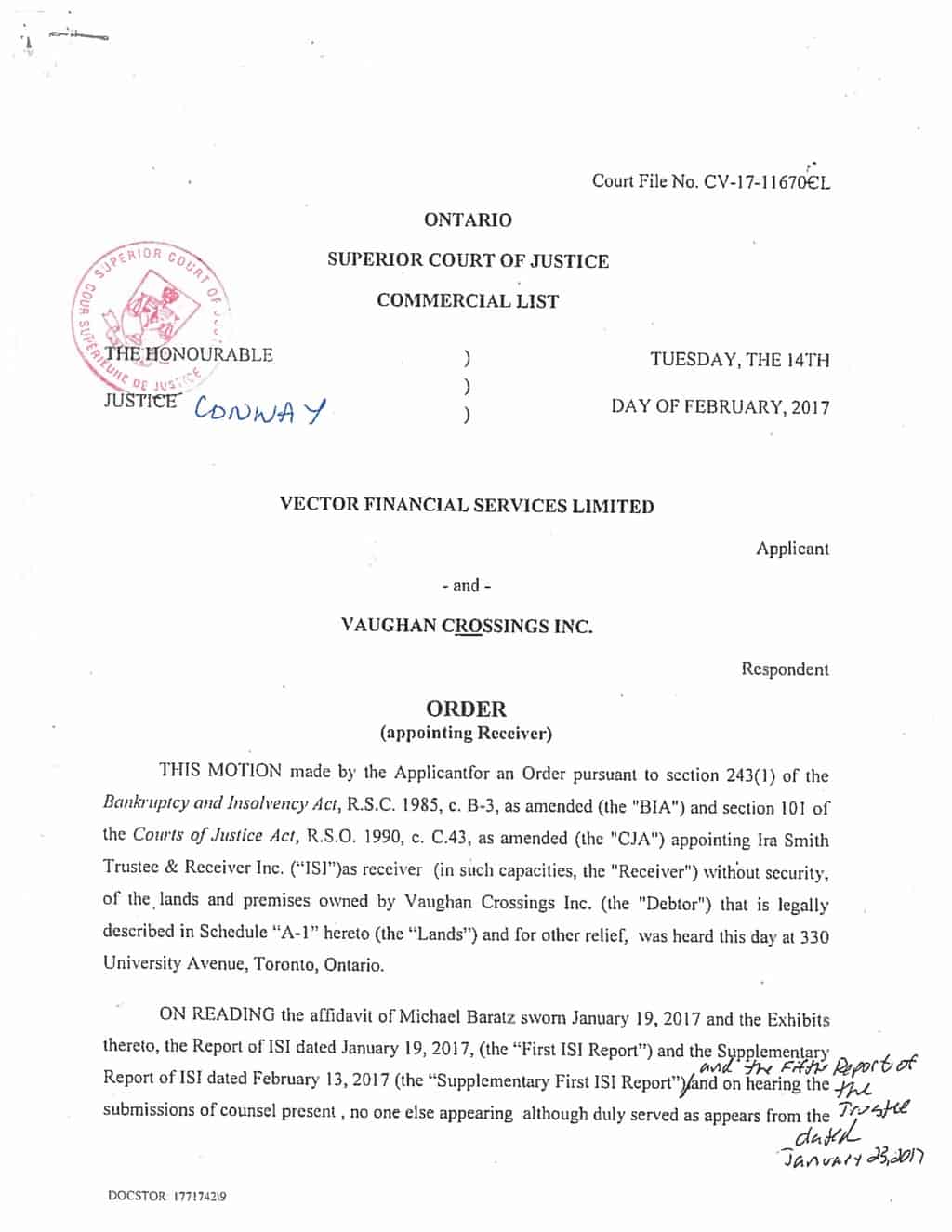- What is a receiver in insolvency?
- What is it?
- What are the duties of a receiver?
- What happens when a company goes into receivership?
- Court of Appeal for Ontario says you better move fast
- Business Development Bank of Canada v. Astoria Organic Matters Ltd., 2019 ONCA 269
- Does your company need to move fast?
What is a receiver in insolvency?
A recent case heard in the Court of Appeal for Ontario clarifies what the time limit is to object to an order made in a Court-appointed receivership of a company in Ontario. The bottom line is you better move fast. Before I describe this very interesting decision, I should first remind newer readers on some receiver 101 basics.
Thank you for reading our Brandon's Blog. Check out our AI insolvency bot on this page and don't forget to subscribe!
What is it?
A receivership is a remedy for secured creditors to enforce their security. In the event, the company defaults on its loan agreement, normally by non-payment, the secured creditor. There are two types of these proceedings in Canada; 1) privately appointed or; 2) court appointed. A receiver might additionally be selected in an investor dispute to complete a task, liquidate assets or market a business.
Typically, the process begins with the secured creditor consulting with a Receiver. If it is decided that there should be a receiver appointed, the secured creditor then makes a choice. They can either appoint the receiver by written appointment letter (privately appointed) or make a motion to the Court for an Order appointing the receiver (court-appointed).
The Bankruptcy and Insolvency Act (Canada) (BIA) states that only a licensed insolvency trustee (formerly called a bankruptcy trustee) can act as a receiver. A privately appointed receiver acts on behalf of the appointing secured creditor. A court-appointed receiver has a duty of care to all creditors.
What are the duties of a receiver?
The receiver’s first duty is to take possession and control of the assets covered by the secured creditor’s security in a private appointment, or all the assets indicated in the court order in a court appointment. The receiver must decide whether it can get a higher value for the assets if it operates the business. Alternatively, the receiver may decide that the risk of operating the business is not worth it in terms of any meaningful increase in the value of the assets.
The receiver then develops a plan to on the running of the business and for the eventual sale of the assets. The type of business and the nature of the assets will dictate what approach the receiver will take. In the meantime, the receiver must inventory all the assets, protect them and make sure there is adequate insurance in place for what the receiver wishes to do in terms of running the business and selling the assets.
In a private appointment, the receiver needs to get the approval of the secured creditor before embarking on the business and asset plan. In a court appointment, the receiver requires the approval of the court.
What happens when a company goes into receivership?
When the company goes into receivership, senior management and the Directors lose most of their authority for decision making. The Directors’ general corporate duty of maintaining corporate records continues, but any decision-making about the running of the business or its assets will not be effective. This is especially true in a court appointment. The subject of Director liability is too broad to start mentioning in this Brandon’s Blog. i am planning to soon write a blog on that topic.
Management’s and employees’ responsibilities about the business in a practical sense will stop upon the appointment of the receiver. Their advice and help are only required if requested by the receiver. They certainly will not be paid for any efforts unless the receiver agrees in writing to make money available for their pay.
Court of Appeal for Ontario says you better move fast
Why the confusion? Isn’t the process for an appeal of a court order straightforward? The confusion comes about because, in the standard model Appointment Order of the Commercial List of the Ontario Superior Court of Justice, the court-appointed receiver is appointed under two statutes:
- Section 101 of the provincial Ontario Courts of Justice Act, RSO 1990, c C.43 (CJA).
- The federal BIA, section 243(1).
The applicant, in this case, was the purchaser of assets from a court-appointed receiver of a company. One of the standard provisions in the Appointment Order is that anyone wishing to take legal action against the receiver must first get the approval of the court to do so.
They brought an application for authorization to sue the receiver over a disagreement arising from the purchase of the assets from the receiver under the asset purchase agreement. On May 17, 2018, the lower court judge dismissed the application, finding that their allegations were not supported by the evidence. On November 8, 2018, the same judge refused their demand to resume the application based on new evidence.
The applicant filed appeals from both decisions. Its notices of appeal were on time under the provincial CJA, under which there is a 30-day time limit for commencing an appeal. They were late under the federal BIA, which imposes a 10-day time limit.
The lower court judge dismissed the appeals. He held that the BIA was the governing authority for the appeal, not the CJA. He stated that the origin of authority under which the receiver was appointed was section 243( 1) of the BIA and therefore appeals are governed by the BIA, not the CJA. He further went on to say that the appointment also under the CJA did not have the result of ousting the BIA as the source of authority. He further held that it also cannot supersede the federal BIA holds paramountcy over the provincial CJA.

Business Development Bank of Canada v. Astoria Organic Matters Ltd., 2019 ONCA 269
The Court of Appeal for Ontario decision was released on April 8, 2019. The appeal court found that this was a very narrow issue to decide so that it did not have to get into the merits of the case of the purchaser wanting to sue the receiver over a disagreement arising from the purchase of the assets from the receiver under the asset purchase agreement.
The Court of Appeal rejected the applicant’s appeal and did not find that the chambers judge made any errors. They said that when the order sought to be appealed was made in reliance on jurisdiction under the BIA, the proper appeal path is the BIA.
The lower court, the Ontario Superior Court Justice Commercial List, rejected the purchaser’s demand to sue the receiver, which is the decision the applicant wishes to appeal. The requirement to get leave of the court to sue the receiver comes from the Appointment Order. The court’s authority to include that arrangement order comes from the statutory power to appoint a receiver under s. 243( 1) of the BIA.
The Court of Appeal agreed that the legal power to appoint a receiver is also found in s. 101 of the CJA. But considering that authority for the leave to take legal action against the receiver comes from the BIA in spite of that the receiver was appointed under both laws, the appeal is governed by the BIA as a matter of paramountcy.
Therefore the Court of Appeal for Ontario dismissed the applicant’s appeal and awarded costs against them.
Does your company need to move fast?
Does your company have way too much debt? Is your company’s cash flow not enough to meet all of its financial obligations? Are you afraid that your company’s main secured creditor is about to demand repayment of its loan in full and you just can’t move fast enough to save your company?
If you answered yes, call the Ira Smith Team today so we can end the tension and anxiousness that these financial problems have triggered. We will develop a plan special for your company, to save it from extinction.
Call the Ira Smith Team today. We have years and generations of experience restructuring and saving companies looking for financial restructuring or a debt settlement approach. As a licensed insolvency trustee, we are the only professionals acknowledged, accredited and supervised by the federal government to provide insolvency advice to save companies.
You can have a no-cost analysis to aid you so we can repair your company’s debt problems. Call the Ira Smith Team today. This will certainly allow you to get back to Starting Over Starting Now.

